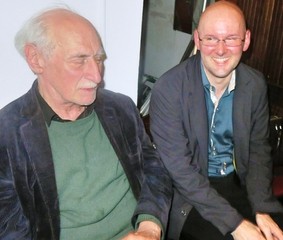|
Back
The Titan In The Tabernacle New York
BargeMusic
05/06/2016 - May 7, 8, 2016
Here and Now Series: “Celebrating Frederic Rzewski”
Frederic Rzewski: Works for speaking pianist: I. Dear Diary (2013; texts by Rzewski): 1. Stuporman; 2. Names; 3. No Good; 4. Samson; 5. Thanks; II. Marriage (The Road, Mile 58) (2002, text adapted from Tolstoy, Kreutzer Sonata); III. Flowers (2009; text adapted from Dickens); IV. De Profundis(1992; text adapted from Oscar Wilde) – The People United Will Never Be Defeated: 36 Variations on “El pueblo unido jamas sera vencido” by Sergio Ortega
Frederic Rzewski, Michael Kirkendoll (Pianos, voice), Ursula Oppens (Piano)

F. Rzewski, M. Kirkendoll at BargeMusic (© Samuel A. Dog)
If this is less a review than an homage, then so be it. Frederic Rzewski, you see, is not an ordinary artist. He dwells in that rare tabernacle of American composers–Ives, Ruggles, Cowell, Partch–who never let down their guard, or ever consider even conceived of whoring their art. And performing his own music in BargeMusic last night, the 78-year-old titan was situated between two other titans of America, Walt Whitman (whose first newspaper was 100 feet away) and Hart Crane, whose iconic Bridge and whose quotes on the waterfront were also just a few hundred feet from the concert hall. (I only wish that Edgar Allen Poe was part of this group, because Rzewski shares the cerebral dark intelligence of that master.)
And while Rzewski’s origin was Polish, he has never been a Chopin salon pianist. His obvious avatar was Beethoven, for his Hammerklavier is one of the great hidden gems, and his People United is the obvious scion of Diabelli. Rzewski’s strength, ideology, independence, his eclectic knowledge, of classical science and history, all blend into a technically difficult, sometimes wearing, but always accessible music.
To hear Rzewski and Michael Kirkendoll play and speak and sing his rare Works for Speaking Pianist made the subway trip to Brooklyn more of a pilgrimage. To hear the complete hour-long 36 Variations on the Chilean leftist anthem, The People United Will Never Be Divided, performed by its devotee Ursula Oppens added a Holy Grail to the pilgrimage.
And I haven’t the slightest desire to apologize for this panegyric on this concert.
The evening before, Carnegie Hall had presented its 125th Anniversary concert with (what MGM used to call) “All the stars in heaven”. I kept firmly away, because I don’t like buffets. Mr. Rzewski wouldn’t have gone near Carnegie Hall either, because the audience of benefactors, billionaires, and business tycoons would have revolted him. In fact, from his very first piece, Stuporman, he blasted the capitalists, just as he later in this work, five-sectioned “Works for Speaking Pianist” he wrote and sung about “Samson”, about those to whom he gives thanks for not being a robot but “being...a...mensch.”
This diary, as well as three other word-pieces is as impossible to classify as Rzewski himself. One thinks inevitably of Berlioz’s Lélio, but that seems improvisatory, self-concerned, words above piano. Rzewski’s piano and speaking voice are equal. Yes, he claims the words–and his voice was strong, mesmerizing. But the Rzewski piano breaks out of its mold with explosions and tendernesses together.
As a colleague of Stockhausen, Christian Wolff and Cage, Rzewski considers himself a serialist. If so, he is a populist serialist, his music packed with emotional jolts, as well as stylistic homages to Beethoven and Bach. And in the most poignant work he could ever write, Flowers, based upon Dickens’ Little Dorrit, a eulogy for a friend, his piano become tender, sensitive, though never ever mawkish or even sentimental.
(While polylingual, Rzewski is ignorant of the words “sentiment” and “mawkish.”)
He shared this part of the program with pianist Michael Kirkendoll, and while this was my first experience with his playing, he was made for the Rzewski complex. In his performance of Rzewski’s Tolstoy and Wilde, he not only played and spoke and sung, but did all the slapping (head and back), drumming on the piano cover, playing inside the box to make the emotions come true.
(Mr. Kirkendoll also introduced the Oscar Wilde with a line that was an honor for BargeMusic: “I suppose most of you are familiar with De Profundis.” That sentence would have fallen flat in Carnegie Hall.)
One must confess that after two hours of words/piano, Mr. Rzewski can give an impression of prolixity. But he says what he must say, and I was thrilled that no intermission was scheduled in this long program. Ursula Oppens was ready to hop on the stage, but some in the packed house needed a breath (Charles Ives would have called them “Sissies!”).
After a few minutes, Ms. Oppens entered and offered music which could never be questioned, with a walloping performance of the Variations which simply were stunning.

U. Oppens at BargeMusic (© Samuel A. Dog)
The score calls for the first measures to be played “with determination” and the Chilean words call for Leftist sentiment. Yet for all we cared, Ms. Oppens could have been a right-wing Republican. The variations were an extrovert essay on the emotions, and its grandeur–whether in counterpoint, improvisation, near-jazz and stateliness–could have been the work of a Busoni or Mahler, circa 1973.
Hearing Ms. Oppens play anything at all is a monument to greatness. Hearing her play Rzewski’s epic work was a pleasure which didn’t need a poor scribe to delineate. Like the composer himself, her goal and success was to illuminate grandeur, delineate creative power and gleefully tear away the veil which separates our art and our humanity.
CODA: BargeMusic is presenting two more concerts. Tonight (Saturday, May 6), Rzewski, Oppens and others will present “Work in progress” and trio. Tomorrow, at 4pm, other works by Rzewski will be on display. It is a splendid weekend.
Harry Rolnick
|